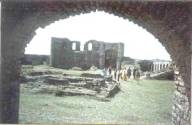Dhannidhar Fort: Difference between revisions
Allenwalla (talk | contribs) (I concur - concurring needs to be changed to conquer//reletics to relatives) |
Hari singh (talk | contribs) mNo edit summary |
||
| Line 5: | Line 5: | ||
Thus the Rajouri principality also came under the jurisdiction of [[Maharaja Gulab Singh]]. Since the new Maharaja asked Raja Raheem Ullah Khan to step down. But Raja Raheem Ullah Khan refused to do so. Maharaja Gulab Singh along with his forces reached Rajouri and dismissed Raja Raheem Ullah Khan and his administration and on 26th of October, 1846, Raja Raheem Ullah Khan was compelled to leave the principality along with his family and relatives. | Thus the Rajouri principality also came under the jurisdiction of [[Maharaja Gulab Singh]]. Since the new Maharaja asked Raja Raheem Ullah Khan to step down. But Raja Raheem Ullah Khan refused to do so. Maharaja Gulab Singh along with his forces reached Rajouri and dismissed Raja Raheem Ullah Khan and his administration and on 26th of October, 1846, Raja Raheem Ullah Khan was compelled to leave the principality along with his family and relatives. | ||
Maharaja Gulab Singh appointed Mian Hathu as the Governor of Rajouri. Mian Hathu governed Rajouri from 1846-1856, starting the construction of Dhannidhar Fort. The stones and material in the construction of the Fort were taken from the ruins of the forts of the [[ | Maharaja Gulab Singh appointed Mian Hathu as the Governor of Rajouri. Mian Hathu governed Rajouri from 1846-1856, starting the construction of Dhannidhar Fort. The stones and material in the construction of the Fort were taken from the ruins of the forts of the [[Jarral Rajas]] that had been destroyed during Maharaja Ranjit Singh's invasion of of Kashmir. | ||
The Fort was completed in 1855. The new fort kept the Dogra Forces safe, as it had a comanding view of the whole valley. The fort also served as a storage place from which the revenue (mostly grain) collected from the farmers could stored for sale during the cold winter months. Today the fort is little more than an old historic ruin. | The Fort was completed in 1855. The new fort kept the Dogra Forces safe, as it had a comanding view of the whole valley. The fort also served as a storage place from which the revenue (mostly grain) collected from the farmers could stored for sale during the cold winter months. Today the fort is little more than an old historic ruin. | ||
Latest revision as of 05:06, 7 November 2010
In 1819 Maharaja Ranjit Singh while conquering Kashmir also captured Rajouri, where he appointed Mirza Reheem Ullah Khan as Raja of Rajouri in place of Raja Agar Khan. Raja Raheem Ullah Khan remained as Rajouri's ruler upto 1846, under the control of Khalsa Darbar of Lahore. On 15th March, 1846, Jammu, Kashmir and Ladhakh were sold by the British to Raja Gulab Singh of Jammu and Kashmir, who had held control of one of the areas under Maharaja Ranjit Singh.
Thus the Rajouri principality also came under the jurisdiction of Maharaja Gulab Singh. Since the new Maharaja asked Raja Raheem Ullah Khan to step down. But Raja Raheem Ullah Khan refused to do so. Maharaja Gulab Singh along with his forces reached Rajouri and dismissed Raja Raheem Ullah Khan and his administration and on 26th of October, 1846, Raja Raheem Ullah Khan was compelled to leave the principality along with his family and relatives.
Maharaja Gulab Singh appointed Mian Hathu as the Governor of Rajouri. Mian Hathu governed Rajouri from 1846-1856, starting the construction of Dhannidhar Fort. The stones and material in the construction of the Fort were taken from the ruins of the forts of the Jarral Rajas that had been destroyed during Maharaja Ranjit Singh's invasion of of Kashmir.
The Fort was completed in 1855. The new fort kept the Dogra Forces safe, as it had a comanding view of the whole valley. The fort also served as a storage place from which the revenue (mostly grain) collected from the farmers could stored for sale during the cold winter months. Today the fort is little more than an old historic ruin.

